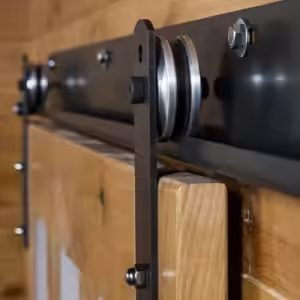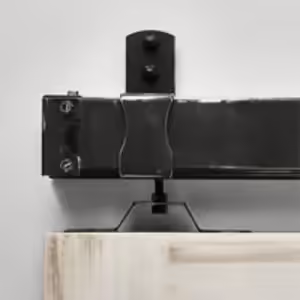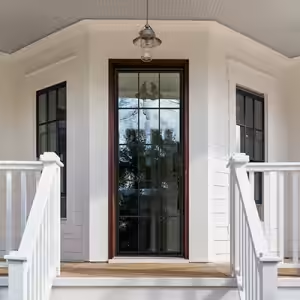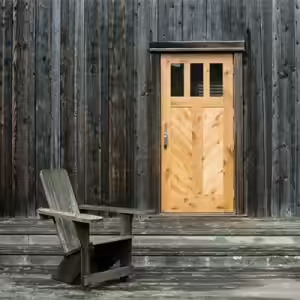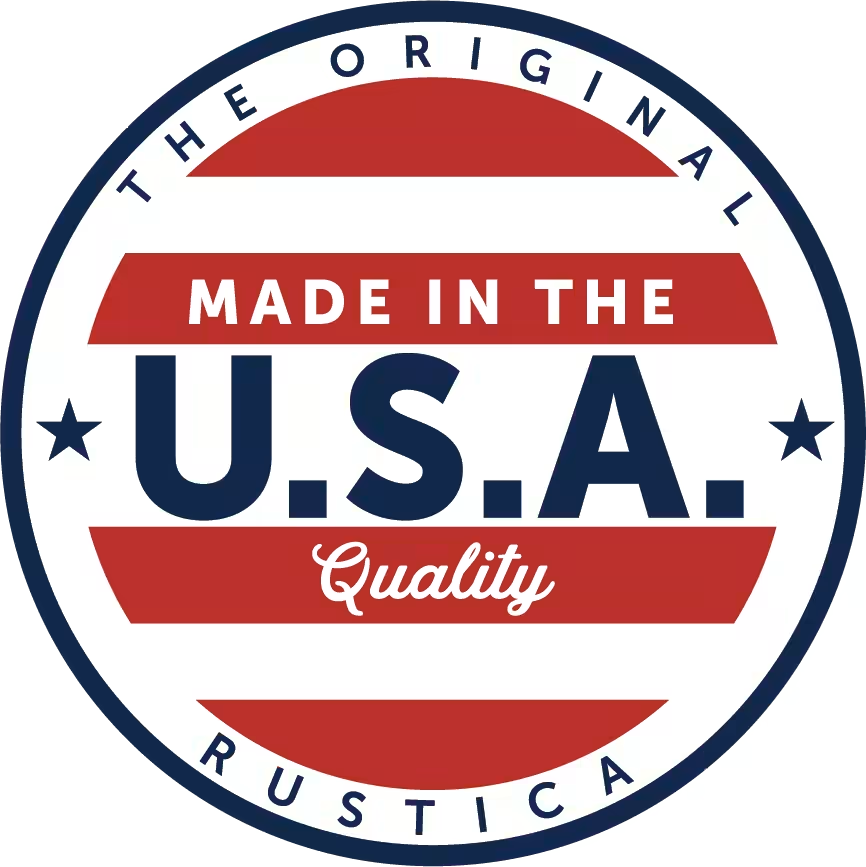8 Commercial Door Considerations
- Security
- Foot Traffic
- Fire Safety
- Insulating Capabilities
- ADA Door Clearance
- Weatherproofing
- Operation
- Appearance
Furthermore, it’s essential to understand why a commercial door requires more attention when compared to residential doors. With this understanding, you can design the exact door for your commercial door needs and know why a regular residential door just won’t cut for your business.
What is a Commercial Door?
A commercial door is specifically designed and manufactured to withstand increased usage and external pressures. Commercial doors are usually more durable, heavier, larger, and stronger than residential doors, and use heavy-duty commercial hardware. Commercial doors can be steel, wood, aluminum, or glass within a metal frame. They can be typical manual doors, barn doors, automated doors, overhead doors, or roll-up doors.While residential doors are still incredibly strong, durable, and secure, they don’t experience wear and tear to the same extent as commercial doors do. Commercial doors need commercial-grade hardware and durability to withstand hundreds of people operating them daily. If a residential door experienced the same usage, it would need frequent repairs, as its hinges and handles wouldn’t be able to withstand the heavy traffic.
A commercial door also has to go through testing to ensure it is strong and durable enough to function in a commercial setting. A commercial-ready door will come with UL and American National Standards Institute (ANSI) signage, which indicates the door has been tested and complies with all safety requirements, including fire safety.
8 Things to Consider When Shopping for a Commercial Door
There are several things to keep in mind when designing a commercial door. This includes:1. Security
Security is one of the most important elements to consider when designing a door for your business. Proper security starts with the strength of the exterior door, and protects your assets, employees, sensitive information, and customers.The type of business you have also affects the level of security your door needs. For example, a commercial storefront will have different security needs than a hospital or government building.
A commercial storefront may have beautiful glass metal doors that invite those passing by to come and look around, while hospital or government building, on the other hand, has public safety and privacy as the essential concern. In this instance, you’d want to use steel doors. A solid steel commercial metal door is by far the strongest and most secure commercial door.
However, a commercial storefront with a commercial glass door can still be fully secure if it has thick safety glass, commercial door hardware, and steel door frames.
You can also invest in heavy-duty locking systems to increase exterior and interior door security. Speaking of which, most commercial doors have door accessories, such as keyless entry through electrical locks, digital means of access, or door key cards.
The type of entry you need depends on your business. No matter your needs, though, it’s prudent to use the newest and most secure locking system. Once the door is installed, you’ll want to hire commercial door technicians to perform regular maintenance checks on the locks and door security system to ensure it is running properly.
2. Foot Traffic
A commercial door will be subject to heavy use, such as constant foot traffic. This is especially true for storefront entryways, where there’s a steady influx of people going in and out.For manual doors, this includes people frequently grabbing the door handle and swinging the door open. For automatic doors, this means the sensory mechanism is constantly triggered to ensure proper accessibility. Due to the usage commercial doors receive, they need specialty hardware, such as heavy-duty commercial door handles, hinges, and regularly maintained automatic door operators (if necessary).
Because of these factors, it’s essential that your commercial door installation is done by professional commercial door contractors using heavy-duty commercial door hardware.
That said, the amount of foot traffic a building receives depends on the business. In light of this, there is a grading system for how strong and durable a commercial door needs to be. These gradings come from the American National Standards Institute, which sets quality control standards for doors and hardware, among other things.
The strongest, most durable safety rated doors receive a Grade 1, which pertains to doors that will receive heavy foot traffic. Grade 2 doors are still strong and durable, but don’t require the same heavy-duty testing because they don’t receive the same extent of foot traffic. Office building doors and small businesses usually have Grade 2 commercial doors, while public buildings, such as hospitals and schools, have Grade 1 commercial doors.
3. Fire Safety
Fire safety is an important element to consider when it comes to choosing a door for your commercial building, as it will determine which materials are necessary. Obviously, metal doors are more fire-resistant than wood, so this is something to consider if you’ve been planning on purchasing a wood door for your business.Fire rated doors are required for safety purposes in some commercial buildings, such as schools, hospitals, and industrial warehouses. For industrial warehouses, fire rated doors are also necessary for areas exposed to harmful chemicals, such as petrol.
Fire rated doors are made with fire-resistant materials, such as steel, and prevent fire from spreading throughout the building. If a fire rated door has glass, then the glass must be fire-rated as well. Wire glass is fire-rated glass, though it isn’t considered safety glass because it’s made with annealed glass.
Wired glass is fire resistant because the wire within the glass holds the glass together when heat from the fire causes it to crack. The heat then causes the glass to melt and “heal” the cracks. The wire holds the glass in place throughout this process, preventing flame, smoke, and hot gasses from passing through. Fire rated glass also must be able to withstand water pressure from a fire hose—which wired glass can also withstand.
4. Insulating Capabilities
It’s no secret that heating and cooling costs rise with poorly insulated doors and windows. Because of this, it’s important to consider the insulating capabilities of your commercial doors. This is especially true if you plan on designing glass doors to accompany a commercial glass storefront.Whether you have a glass double door or an automatic door, if you choose the most energy-efficient, insulated glass, you’ll significantly enhance your door’s insulating capabilities.
Insulated glass refers to windows or door glass with two or more glass panes, such as a double or triple-pane window, with the space between the window panes filled with insulating gas. A specialty coating, such as low E, will also increase the insulating capabilities of the glass.
Other door accessories you might consider to increase insulation include the door threshold and door sweep. You’ll want to ensure you have high-quality, commercial-grade door closers so that the doors fully close and latch. Commercial door closers also reduce the amount of outside air that filters into the building, which helps stabilize internal temperatures.
For steel doors, a commercial door services technician can install an exterior steel door drip cap that prevents water infiltration and increases the longevity of the door.
5. ADA Door Clearance
Along with the functionality of your commercial door, it also has to adhere to specific building code regulations, including ADA door clearance. ADA stands for the Americans with Disabilities Act, which was established to ensure that people with disabilities are protected and have the same access to public buildings, services, and commodities as anyone else.ADA door clearance details the dimensions required for a door to meet ADA standards. The law outlines the standards for both manual doors and automatic doors. This includes standard door width, standard door height, ADA door swing clearance, ADA door opening clearance, the ability to access the entrance of a building, and door maneuvering clearance. It also describes the closing speed of the door, the amount of force required to open the door (referred to as opening force), the height of the door window (if applicable), compliant door accessories, and more.
All public entrances and interior doors need to have ADA clearances for universal accessibility. This means that those who use a wheelchair, walker, or other mobility device have enough room to pass through the door and enough space to maneuver in front and behind it.
6. Weatherproofing
Weatherproofing your commercial exterior door is similar to how you increase its insulating capabilities. Just as you would for insulation, you want to consider a commercial door sweep or threshold, strong door closes and hinges, and high-quality weather stripping and finish.One other thing to consider is that your exterior door will be exposed to the elements, like extreme wind, rain, hail, and snow. You’ll want your door to be strong enough to withstand these impacts and stay fully sealed so that it doesn’t allow moisture or air into the building.
Metal doors and glass doors with a steel door frame are more weatherproof than wood doors, as long as they are properly cared for and equipped to handle strong external impacts. For door glass, you’ll want to use strong and durable safety glass, either laminated glass or tempered glass.
7. Operation
Another important consideration is how the commercial door will operate. This includes how the door opens—will it be an automated door or a manual door? You’ll also want to think about the opening force of the door and the door handles.ADA guidelines require commercial door handles to allow for one-hand operation—that means no tight grasping, pinching, or wrist twisting movements. It requires that the commercial door handle can be operated with a loose grip or closed fist, such as U-shaped pulls and lever-shaped handles, which accommodate the greatest range of users.
The ADA also has specific requirements around automated doors, such as door opening and closing speed. It’s worth checking these standards to ensure that your commercial door is ADA-compliant.
8. Appearance
Last, but certainly not least, you’ll want to consider the appearance of your commercial door. While functionality is critical to the success of your commercial door, it doesn’t invalidate the importance of the door’s aesthetic.The entryway to your commercial building sets the first impression people will have as they enter your business. Because of this, you’ll want an entryway that represents the quality and aesthetic of your brand, while still being fully functional and code compliant.
Because interior doors don’t require the same durability as exterior ones, you get more creative with their appearance. For example, a modern office within a commercial building can use interior architectural doors that symbolize the style of the business.
Design a Custom Commercial Door with Rustica Today!
Designing a custom commercial door is much different than designing a residential door, as there is so much more you need to consider. Along with building codes and ADA standards, you also have to think about the security, foot traffic, fire safety, insulating capabilities, weatherproofing, operation, and appearance of your door.The benefit of considering these aspects before you purchase a commercial door is that you don’t have to worry about the door not having the functional requirements it needs to operate in a commercial setting. At the end of the day, it means less work and a better door for your business.
If you’re ready to design a custom, high-quality commercial door today, contact Rustica’s design team! By consulting with our design team, you can create the perfect door for your business. We’re able take care of all your commercial door needs—including heavy-duty commercial barn door hardware and more!
Note: Because commercial doors have more custom construction requirements than residential doors, you’ll want to consult with Rustica’s design team rather than ordering directly from the website.

 800-891-8312
800-891-8312


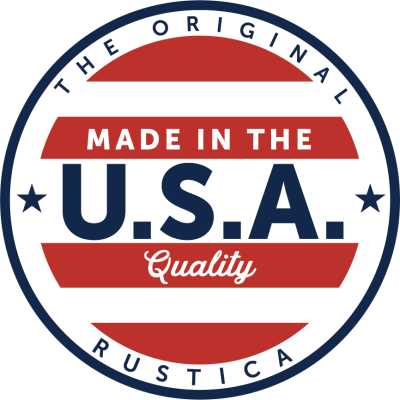

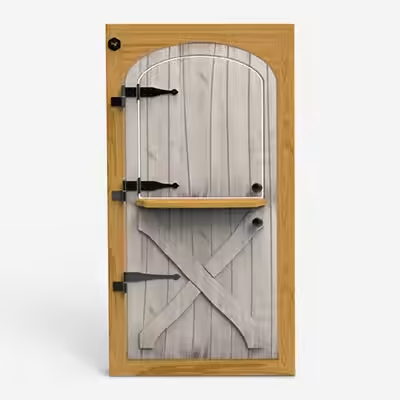

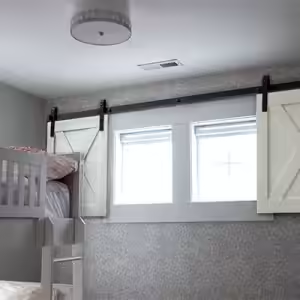


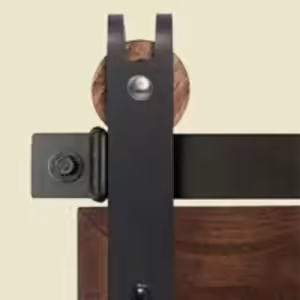

-1601395521090.avif)
